Blog by Dr Raúl Valdivia-Murgueytio, EdJAM Research Associate, University of Bristol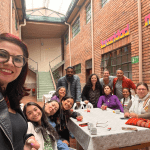
The EdJAM regional event in Bogota, Colombia, was a resounding success. During the last week of July, colleagues from all the EdJAM-funded projects in Latin America came together to share their approaches to dealing with the violent past in their communities. This was also an opportunity to get to know each other in person after a year of online meetings, and to discuss future collaborations.
In the best tradition of educación popular, the event was organised around the idea of talleres (workshops in English). Each team ran a two-hour workshop in which they introduced their project and methodology through a series of hands-on exercises and group discussions. Although some conversations were difficult due to the nature of the themes under consideration, the strong sense of camaraderie meant that people felt safe to share their experiences and support each other when needed.
The first day of the encuentro kicked off with an ice-breaking activity about what justice, memory and peace meant to us individually. Resistance, hope, love and the capacity to imagine different futures free from violence were amongst people’s thoughts. This activity set the tone for the thoughtful, empathetic and joyful exchange of ideas that would define the entire event. After a break, we went on a guided tour to the Centro de Memoria, Paz y Reconciliación where we learned about the violent past in Colombia and ways of keeping memory alive through artistic and architectural interventions.
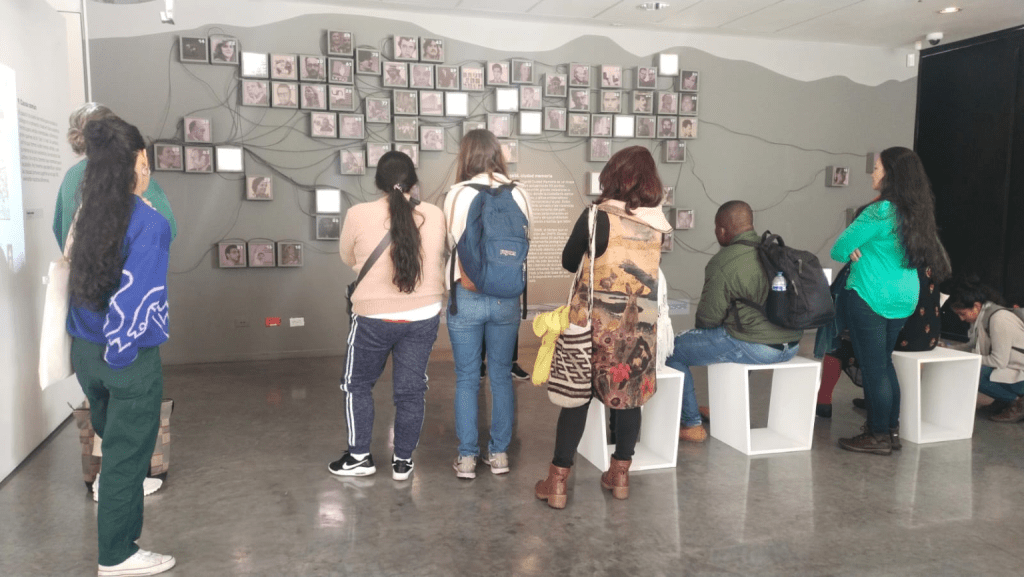
Back at our accommodation and after a delicious meal, Yamili and Sara from the U kúuchil kaambal kuxtal: School for life project (based at the U Yich Lu’um organisation) in Yucatan, Mexico, led on a workshop that highlighted the importance of reconnecting with the land and valuing ancestral traditions and languages, such as Mayan. They took us on a journey back to our own childhood and invited us to think of a tree that was significant to us when we were growing up. We then drew our trees and wrote down a message they might want to give out. This workshop managed to successfully combine elements of memory and artistic expression which were also present in all the other workshops.
Our colleagues from the (Des)tejiendo Miradas project in Medellín, who were also the hosts of the event, ran the next workshop, focusing on alternative ways of narrating stories. We moved from writing and drawing to ‘hands and needle’ in order to create what they described as textile narratives. There was something powerful about engaging with an artistic practice (embroidery) that enabled us to express ourselves beyond words. Beatriz, Berena, Camila, Laura, Marta and María Teresa showed us the potential of this methodology for challenging hegemonic narratives of the internal armed conflict in Colombia and of those constructed as the enemy in the country.
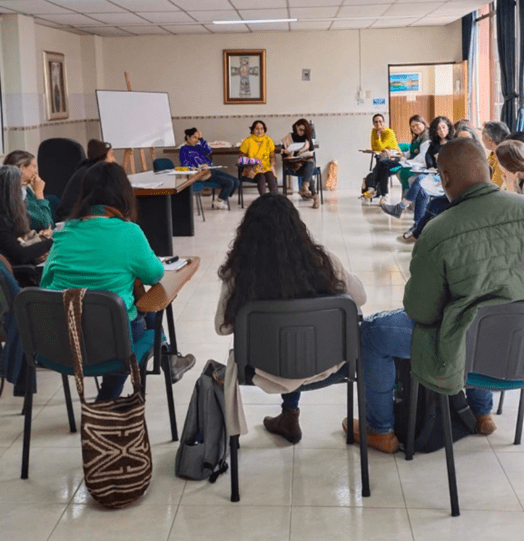
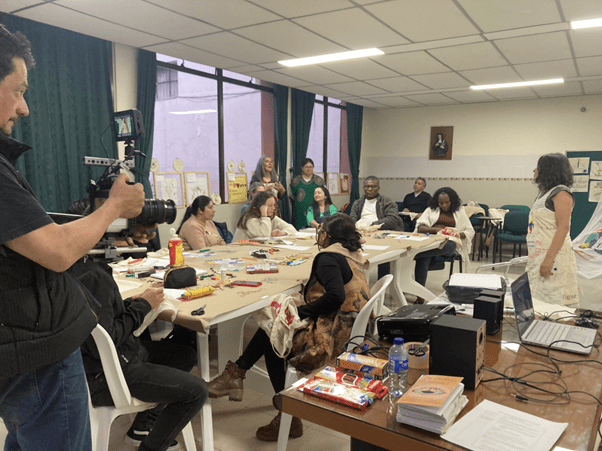

The second day of the event started with a workshop run by Mónica and Noelia from the Cartografías Intimas en Comunidad project in Buenos Aires, Argentina. Their methodology is based on the idea of mapping the multiple layers of violence embedded in the public space, which often go unnoticed. They cleverly positioned some powerful pictures related to the guerra sucia in Argentina on different walls around our accommodation. As we walked through the space, we learned about the state terrorism experienced by ordinary citizens during the military dictatorship in Argentina, which still haunts the country today. In the second part of the workshop, we were asked to resignify a map of Latin America by adding images of places in the region that were meaningful to us and finding connections between them. Like with the previous workshops, this one also succeeded in creating a space for individual reflection and mutual learning.
The next workshop was delivered by Nancy and Melvis. Their project, Weaving resistance from mountain to mountain, uses weaving as a medium to narrate the stories of two peasant communities in the north of Colombia, Silos and Los Montes de María, the latter with a strong Afro-Colombian tradition. After picking our favourite colour of skein, we were taught how to weave using only our hands. Our creative juices flowed during those two hours, as pieces of yarn were turned into intricate shapes. This workshop, and the one about embroidery, allowed us to engage with the political and therapeutic dimensions of a creative practice that is often diminished. Interestingly, at the time of writing this blog, an article in The Guardian highlighted a series of forthcoming exhibitions in the UK about the political power of textiles and embroidery.
In the afternoon, we visited the Museo Nacional de Colombia, where a group of young people from El Bronx in Bogota talked about this notorious area that has been recently regenerated and turned into an artistic and cultural hub known as Bronx Distrito Creativo. After this eye-opening experience, we went to the Casa de la Paz, a space founded and managed by former members of the FARC. This was an interesting opportunity to learn about the peace process in Colombia and to try some of the excellent craft beers produced by this organisation, which are their main source of income. Certainly a good excuse to have a drink or two!
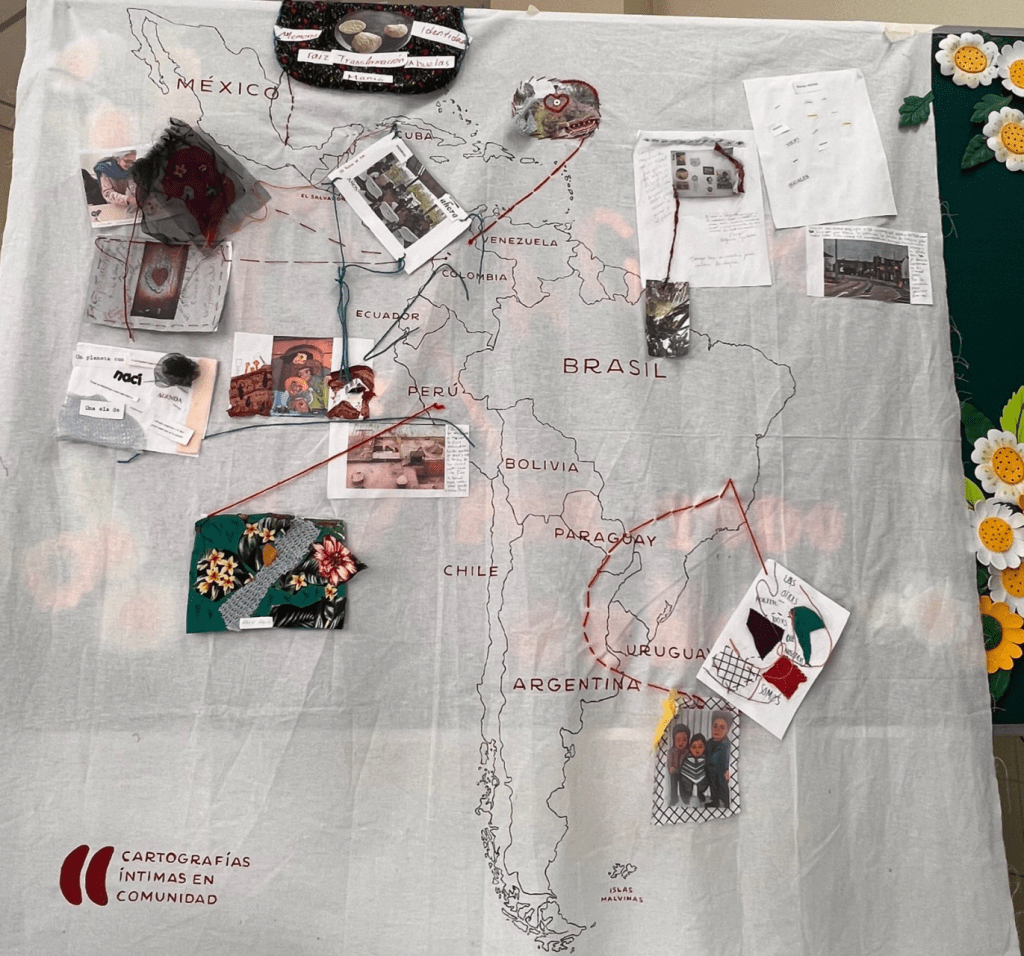

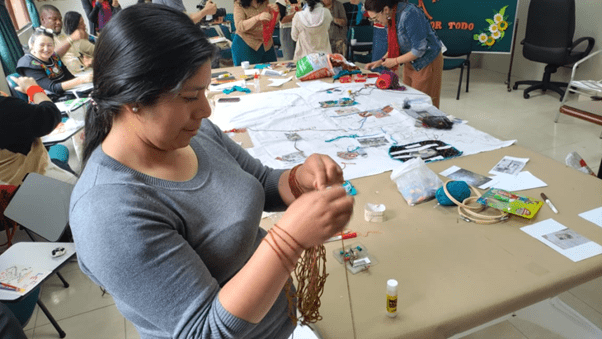
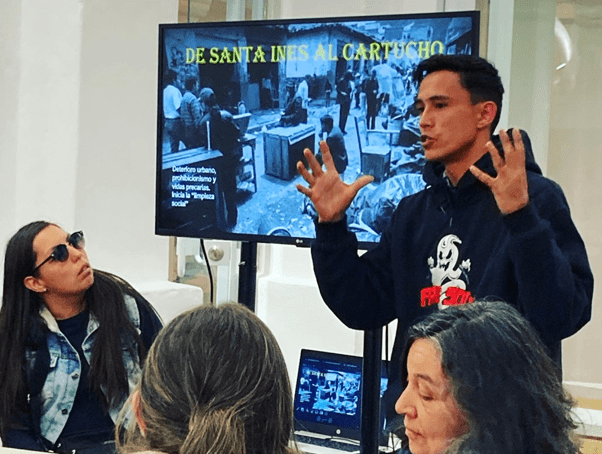
Ana Luisa, Jenry and Daniel from Co-creation of Storytelling and Listening Pedagogies for Peacebuilding in Colombia began the third day of the event with a workshop based on Nuestra Orilla: a series of podcasts about the history of Bajo Atrato, a region in the northern Colombian Department of Chocó with a large Afro-Colombian population. We were invited to listen to two podcasts which beautifully combined the sounds of this tropical area with the stories of its inhabitants narrated through the life story of Ana Luisa. As we closed our eyes, we were magically transported to a territory that, as the newly launched project website points out, is much talked about but seldom listened to. After the podcasts were played, we spent some time discussing how we felt about this aural experience and exploring notions around territory, identity, representation and resistance together.
The next workshop was led by Elvira and Stephanie from the Mosqoy organisation in Cuzco, Peru. Their project, T’ikary: An educational project for Quechua youth aims to value traditional practices and indigenous knowledges in the Andes, which the national curriculum in Peru fails to acknowledge. Ultimately, their intention is to prepare young people for a globalised world, while keeping their cultural identity alive. Many of the young people supported by Mosqoy want to work in the tourist industry in Peru, so it is important for them to understand the demands of this international business, but without losing their appreciation for the local history and culture. During the workshop, we were asked to create self-portraits as a way of expressing our own identity. The results were diverse in terms self-representation and spoke of a rich tapestry of multiple identities.
The last workshop was run by Ana and Iván from Palabreras y Callejeras, a Colombian organisation that uses street art to decolonise ways of being, knowing and doing. They transformed the meeting space into a printing workshop in which we were taught about different printing techniques and how to convey key messages in a few words. The end product was a series of bold prints that expressed people’s reflections on what we have learned throughout the week. For all of us, but especially for those working in academia, it was truly liberating to be able to take part in a non-hierarchical process where the expectation wasn’t to arrive to definite answers. The intellectual rigour and cool detachment from societal struggles that is deemed essential for the production of ‘true knowledge’ gave way to an embodied and creative practice in which multiple lines of inquiry could be entertained and collectively pursued.
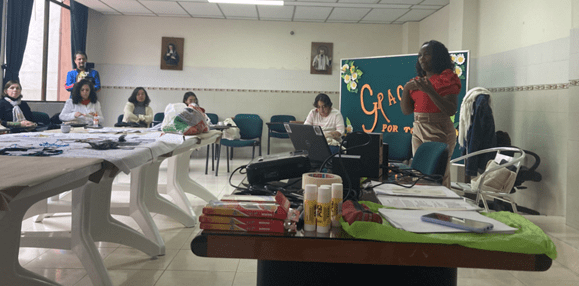

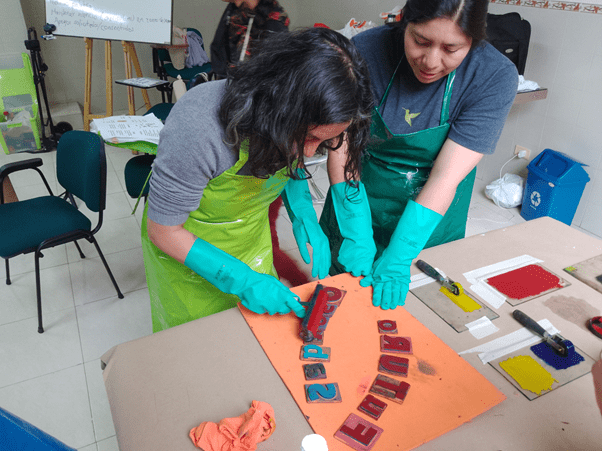
On the last day of the event, we had an online session with other EdJAM colleagues from around the world. We also had time to discuss the next steps for this regional network, including the development of a multi-authored publication focused on these different decolonial methodologies grounded in the everyday struggles of communities affected by violence. Finally, our colleagues from Palabreras y Callejeras provided a wonderful tour of the socially-engaged street art found in downtown Bogota. As the event came to a close, we all reflected on a week in which sharing, listening and caring for each other helped to create a very special encuentro (translates in English to meeting) . People spoke of feeling not only revitalised, but also reassured that they were not alone in their quest to build a more just world, filled with love and solidarity beyond national borders.
Blog written by Dr Raúl Valdivia-Murgueytio, EdJAM Research Associate, University of Bristol
This blog was originally published on the EdJam Network website: BlogJAM: Latin America Regional Encuentro – Four Days of Mutual Learning and Good Vibes – edJam
